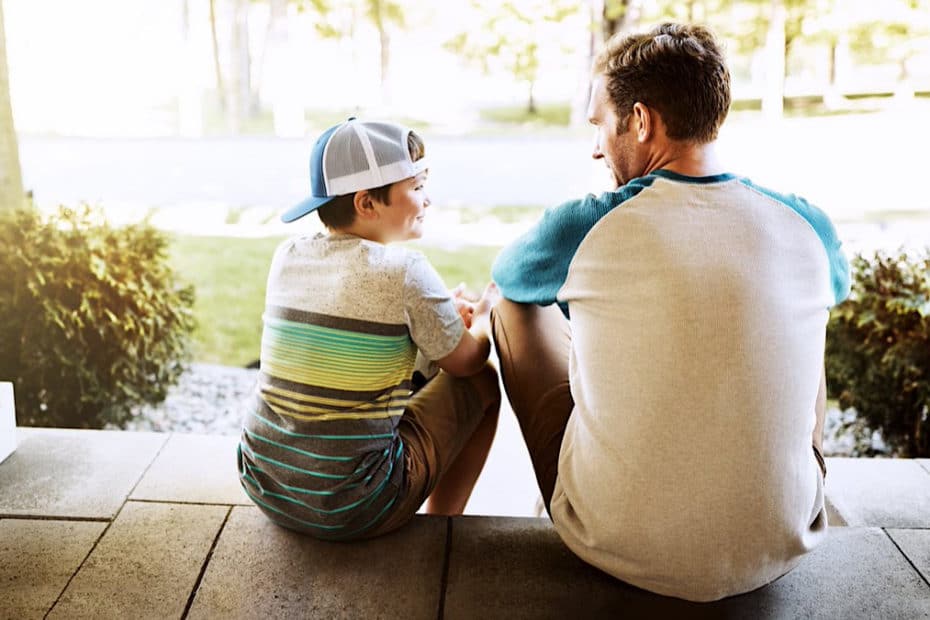Excerpt: 9 Rules for Children from Jordan Peterson that can offer you a solid framework to build off of when structuring home life for your kids.
The following list of rules for children are suggested from Jordan Peterson’s book, 12 Rules for Life. I found them to be incredibly valuable and worth reflecting on and sharing. After each rule, the thoughts that follow are my own and represent some additional food for thought for you to consider.
This, at the very least, can offer you a solid framework to build off of when structuring rules for the kids in your life. And pay close attention, these rules aren’t arbitrary or random. They’re carefully thought out and put into place for specific, practical reasons (that Peterson points out and I elaborate on).
This is always a good idea as not only will kids push the boundaries and break these rules, but they will question why the rules are even in place and argue with you about having to follow them. Having clear reasons and swift responses will quickly neutralize rebuttals and further argument. That being said, don’t put rules in place that you aren’t willing to enforce 100% of the time and furthermore, be ready to enforce the rules that you decide to put into place 100% of the time.
Failure to do so, in either instance, will bring ‘gray area’ and exceptions to the rules that will be difficult to recover from afterwards. I hope they find you and the kids in your life well.
NEW In The Shop: Don’t Let The Tame Ones Tell You How To Live [Poster]
Why We ♥ It: Some of the best advice I (Matt here) ever got was: don’t take life advice from people who aren’t living a life you want to live and don’t take criticism from people you wouldn’t go to for advice. I created this poster to act as a reminder to listen more closely to our role models and less closely to our critics, trolls, and tamed-comfort-zone-hugger acquaintances. It’s also a perfect gift for the outdoor adventurer, travel enthusiast, or solo explorer (or soon to be). Available in print or digital download. 👇🏼
...Want to advertise your book, product, or service? Send inquiries to matt@movemequotes.com.
9 Rules for Children from 12 Rules For Life by Jordan Peterson
1) “Do not bite, kick or hit, except in self-defense.” And yes, if self-defense is required, bite, kick and/or hit. It’s okay for kids to defend themselves and to stand up to those who are threatening their safety. The first step is to avoid potentially dangerous situations/ people. If that doesn’t work then the second step is to stay calm (so that they can make better decisions) and clear (so they can’t get hit if they aren’t ready). Third step is to communicate with confidence and to tell the aggressor EXACTLY what they want—to STOP, to LEAVE THEM ALONE, to BACK OFF, etc. And finally if, after those steps are taken and the aggressor still advances maliciously towards them, they need to know it’s okay to defend themselves—regardless of where it’s taking place. Having some martial arts training is a good idea for situations like this.
2) “Do not torture and bully other children, so you don’t end up in jail.” Bullying is repetitive and intentional wrong-doing towards another. This type of behavior escalates quickly and never leads to positive outcomes. Torturing and bullying others can have severe consequences and making it clear to our kids that repetitive and intentional wrong-doing is never tolerated is crucial. Don’t assume that this is understood. Many kids bully without even realizing they’re doing it. Ensure that your kids understand what it means to bully other children, the effects it can have, and communicate this rule to them clearly and with conviction.
3) “Eat in a civilized and thankful manner, so that people are happy to have you at their house, and pleased to feed you.” If kids are going to be civilized and thankful at other people’s houses, they need to act that way in their own house. Saying “please” and “thank you”, chewing with their mouth closed, cleaning up after themselves, not playing with food, etc. are good ones to consider. Make this practice into a daily habit—or at the very least, practice (and remind them about) how to act properly, daily—and everybody will be pleased to feed them.
4) “Learn to share, so other kids will play with you.” The act of sharing might be one of the easiest tools for your kids to use to make friends. When a kid chooses not to share, they are choosing to retain control, to deny compromise, and to turn away connection. This doesn’t necessarily mean that they have to share all of the time—but learning HOW to share is critically important in learning proper socialization skills, how to compromise with others, how to empathize with others, and other important skills that facilitate proper development and social integration.
5) “Pay attention when spoken to by adults, so they don’t hate you and might therefore deign to teach you something.” In a perfect world, kids would pay attention by looking at adults in the eyes, with perfect posture, attentive ears, and a steady stance—but this is hardly realistic. Kids are wild and experimental and short on attention spans. There ARE things that should always be enforced however—looking up from the screen when an adult is talking is a good one (yes, all games have a ‘pause’ function). Multi-tasking is a myth and just as we are incapable of doing it, our children are undoubtedly incapable as well. You can bet that if they’re choosing where to focus their attention when it’s between their parents and their video game, well, I’m sure you already know the answer to that one. Utilize that pause button. Make sure they respect the adults in their lives and the adults in their lives will be more inclined to teach them something that they will be thankful they had the chance to learn.
6) “Go to sleep properly, and peaceably, so that your parents can have a private life and not resent your existence.” Teaching children how to go to sleep properly and peaceably is a conversation in and of itself. And there are other sources that can outline how to do this properly better than I can. But the importance of this shouldn’t be understated. Get your kids into a routine and make sure you and your loved one are able to have a private life.
7) “Take care of your belongings, because you need to learn how and because you’re lucky to have them.” If they’re brought up in a world where they never have to take responsibility for their things and are “spoiled” to the point where they have a constant flow of new and better belongings, why would gratitude and care be a priority? If they break something, have them work in a way that’s appropriate for their age before it gets fixed or before they can get a new one. Give them an allowance that they have to save up and use before they can buy things they desire rather than just buying them stuff arbitrarily, at random, and after temper tantrums—that will lead to never ending begging and negotiation. Show them videos or share with them stories about people who have less. Open their eyes to the rest of the world and let them internalize how lucky they really are. Get them to appreciate what they already have. Telling them to be thankful isn’t enough. You need to show them or immerse them in an experience for it to actually stick.
8) “Be good company when something fun is happening, so that you’re invited for the fun.” Engrain the golden rule into the minds of your child as best you can. Treat others the way you want to be treated is so powerful and important to practice. When at birthday parties, have them celebrate the birthday boy or girl the way they would want to be celebrated. When playing a game with friends, ensure they play the game the way they would want it played—fairly and with good intent. When talking to other kids, make sure they’re speaking words that they would want said to them—compliments, jokes, interesting questions, etc. This way, they will get invited back for the fun the next time too.
9) “Act so that other people are happy you’re around, so that people will want you around.” This pretty much closes any open ends left from the rules above.
In summary, Peterson concludes that, “A child who knows these rules will be welcome everywhere.” And having a child who is welcome everywhere is a good sign that your child is integrating into the world optimally.
Again, this is not an all inclusive or definitive list. Some kids have special needs and some parents have different teaching styles—that’s okay. This is meant to serve as a framework off of which you can build and make appropriate for your circumstance.
Modify and adapt as you see fit, but get something established that’s solid and you feel good about and be ready to enforce it 100% of the time. It might be one of the most important efforts you undergo for the kids in your life to succeed.
Read Next:
NEW In The Shop: Don’t Let The Tame Ones Tell You How To Live [Poster]
Why We ♥ It: Some of the best advice I (Matt here) ever got was: don’t take life advice from people who aren’t living a life you want to live and don’t take criticism from people you wouldn’t go to for advice. I created this poster to act as a reminder to listen more closely to our role models and less closely to our critics, trolls, and tamed-comfort-zone-hugger acquaintances. It’s also a perfect gift for the outdoor adventurer, travel enthusiast, or solo explorer (or soon to be). Available in print or digital download. 👇🏼
...Want to advertise your book, product, or service? Send inquiries to matt@movemequotes.com.

Written by Matt Hogan
Founder of MoveMe Quotes. On a mission to help busy people do inner work—for better mental health; for healing; for personal growth. Find me on Twitter / IG / Medium. I also share daily insights here. 🌱
It has taken me 1,000’s of hours to build this free library for you. If it has helped you, you can support my continued effort here. ☕️


![To My Daughter. [Excerpt]](https://movemequotes.com/wp-content/uploads/2023/06/Daughter.jpeg)



